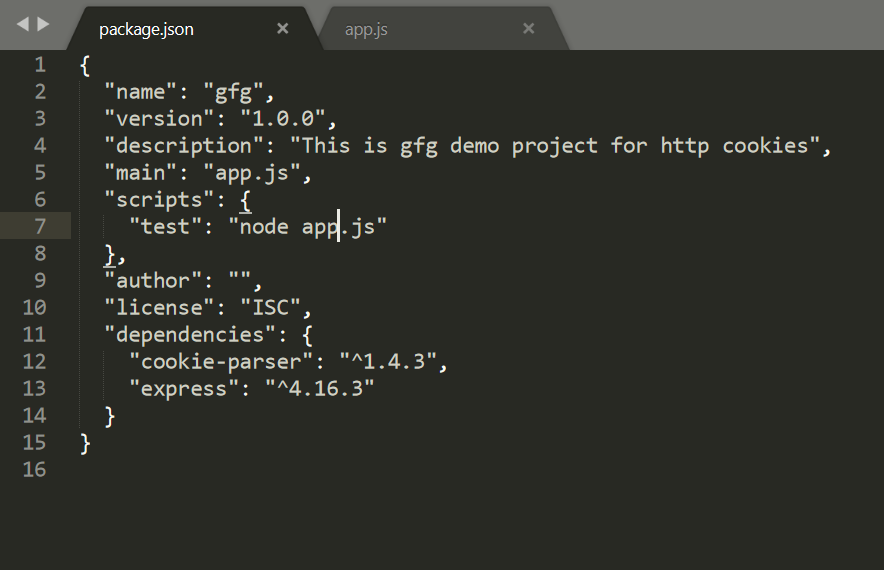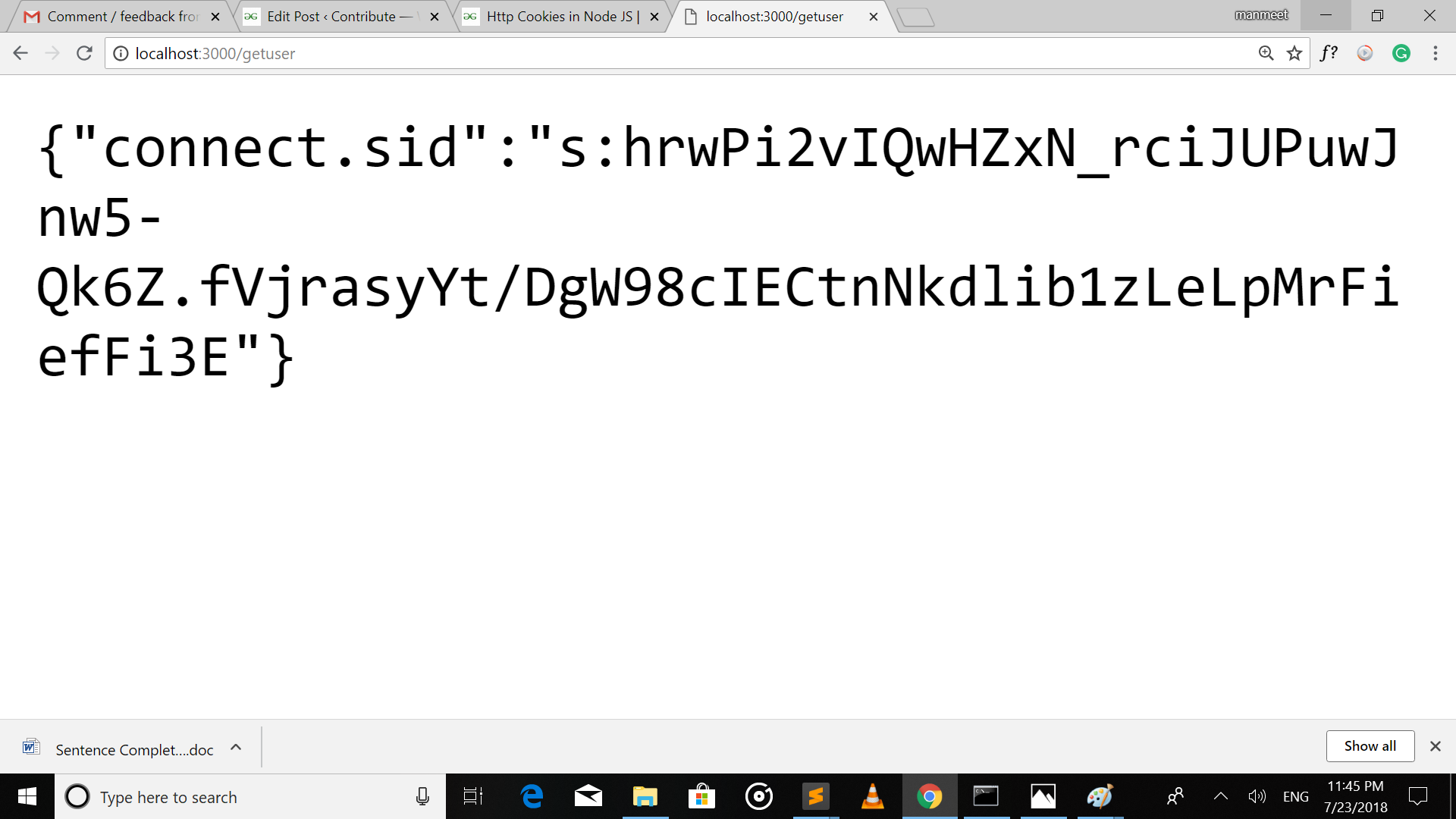HTTP Cookies in Node.js
Last Updated :
19 Feb, 2019
Cookies are small data that are stored on a client side and sent to the client along with server requests. Cookies have various functionality, they can be used for maintaining sessions and adding user-specific features in your web app. For this, we will use cookie-parser module of npm which provides middleware for parsing of cookies.
First set your directory of the command prompt to root folder of the project and run the following command:
npm init
This will ask you details about your app and finally will create a package.json file.
After that run the following command and it will install the required module and add them in your package.json file
npm install express cookie-parser --save
package.json file looks like this :

After that we will setup basic express app by writing following code in our app.js file in root directory .
let express = require('express');
let app = express()
app.get('/', (req, res)=>{
res.send('welcome to express app');
});
app.listen(3000, (err)=>{
if(err)
throw err;
console.log('listening on port 3000');
});
|
After that if we run the command
node app.js
It will start our server on port 3000 and if go to the url: localhost:3000, we will get a page showing the message :
welcome to express app
Here is screenshot of localhost:3000 page after starting the server :

So until now we have successfully set up our express app now let’s start with cookies.
For cookies first, we need to import the module in our app.js file and use it like other middlewares.
var cookieParser = require('cookie-parser');
app.use(cookieParser());
Let’s say we have a user and we want to add that user data in the cookie then we have to add that cookie to the response using the following code :
res.cookie(name_of_cookie, value_of_cookie);
This can be explained by the following example :
let express = require('express');
let cookieParser = require('cookie-parser');
let app = express()
app.use(cookieParser());
app.get('/', (req, res)=>{
res.send('welcome to express app');
});
let users = {
name : "Ritik",
Age : "18"
}
app.get('/setuser', (req, res)=>{
res.cookie("userData", users);
res.send('user data added to cookie');
});
app.get('/getuser', (req, res)=>{
res.send(req.cookies);
});
app.listen(3000, (err)=>{
if(err)
throw err;
console.log('listening on port 3000');
});
|
So if we restart our server and make a get request to the route: localhost:3000/getuser before setting the cookies it is as follows :

After making a request to localhost:3000/setuser it will add user data to cookie and gives output as follows :

Now if we again make a request to localhost:3000/getuser as this route is iterating user data from cookies using req.cookies so output will be as follows :

If we have multiple objects pushed in cookies then we can access specific cookie using req.cookie.cookie_name .
Adding Cookie with expiration Time
We can add a cookie with some expiration time i.e. after that time cookies will be destroyed automatically. For this, we need to pass an extra property to the res.cookie object while setting the cookies.
It can be done by using any of the two ways :
//Expires after 400000 ms from the time it is set.
res.cookie(cookie_name, 'value', {expire: 400000 + Date.now()});
//It also expires after 400000 ms from the time it is set.
res.cookie(cookie_name, 'value', {maxAge: 360000});
Destroy the cookies :
We can destroy cookies using following code :
res.clearCookie(cookieName);
Now let us make a logout route which will destroy user data from the cookie. Now our app.js looks like :
let express = require('express');
let cookieParser = require('cookie-parser');
let app = express()
app.use(cookieParser());
app.get('/', (req, res)=>{
res.send('welcome to express app');
});
let users = {
name : "Ritik",
Age : "18"
}
app.get('/setuser', (req, res)=>{
res.cookie("userData", users);
res.send('user data added to cookie');
});
app.get('/getuser', (req, res)=>{
res.send(req.cookies);
});
app.get('/logout', (req, res)=>{
res.clearCookie('userData');
res.send('user logout successfully');
});
app.listen(3000, (err)=>{
if(err)
throw err;
console.log('listening on port 3000');
});
|
For destroying the cookie make get request to following link: user logged out[/caption]
To check whether cookies are destroyed or not make a get request to localhost:3000/getuserand you will get an empty user cookie object.

This is about basic use of HTTP cookies using cookie-parser middleware. Cookies can be used in many ways like maintaining sessions and providing each user a different view of the website based on their previous transactions on the website.
Share your thoughts in the comments
Please Login to comment...